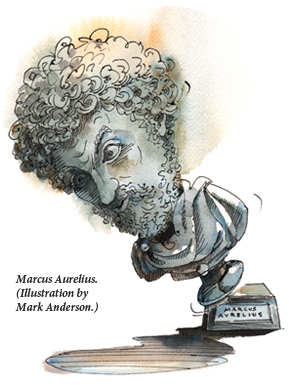Light Reading
In Michael Chabon’s Telegraph Avenue, Archy Stallings carries around a paperback copy of Marcus Aurelius’s Meditations “that he must have read 93 times.” Archy, a jazz musician, wayward husband, and almost-father who sells vinyl records in Oakland, is more lovable screw-up than Stoic, and we never do learn exactly what he treasures in the Meditations, but Stoicism has been making a comeback of late.
Back in 1998, around when Chabon’s novel is set, the hero of Tom Wolfe’s A Man in Full discovers Epictetus in prison and comes out to preaching the good word of apatheia, or freedom from passion. “We ought not spend our feelings on things beyond our power,” Epictetus said, which is good advice when possible, especially for those obsessed with the things Tom Wolfe’s characters tend to be obsessed by (money, prestige, excellent trapezius muscles). More recently, William Irvine wrote a pretty good self-help book called A Guide to the Good Life: The Ancient Art of Stoic Joy. (Irvine, a professional philosopher, rather charmingly admitted that he first learned of Stoic ethics from Wolfe’s novel.) Down on the deeper end of the philosophical pool, Martha Nussbaum has recently elaborated an interesting Neo-Stoic theory of emotions.
 More recently, classicist Philip Freeman has repackaged some of Cicero’s political insights in a little book entitled How to Run a Country: An Ancient Guide for Modern Leaders, and Seneca is the philosophical hero of Nassim Nicholas Taleb’s best-selling Antifragile: Things That Gain from Disorder, although as far as I can tell the Roman philosopher is never quite quoted directly. “My idea of the modern Stoic sage,” the Black Swan guru of financial pessimism says, “is someone who transforms fear into prudence, pain into information, mistakes into irritation and desire into undertaking.” Italics notwithstanding, this is not always possible. The phrase “pain into information” reminds me of a moment early on in Catch-22, when Captain Yossarian’s lover tells him that God created pain as a useful warning system. “Why couldn’t he have used a doorbell, instead?” he asks. Maybe if Yossarian had carried Marcus Aurelius around he might know that neither pain nor doorbells are evils in and of themselves but only insofar as we regard them as such and this is always in our power.
More recently, classicist Philip Freeman has repackaged some of Cicero’s political insights in a little book entitled How to Run a Country: An Ancient Guide for Modern Leaders, and Seneca is the philosophical hero of Nassim Nicholas Taleb’s best-selling Antifragile: Things That Gain from Disorder, although as far as I can tell the Roman philosopher is never quite quoted directly. “My idea of the modern Stoic sage,” the Black Swan guru of financial pessimism says, “is someone who transforms fear into prudence, pain into information, mistakes into irritation and desire into undertaking.” Italics notwithstanding, this is not always possible. The phrase “pain into information” reminds me of a moment early on in Catch-22, when Captain Yossarian’s lover tells him that God created pain as a useful warning system. “Why couldn’t he have used a doorbell, instead?” he asks. Maybe if Yossarian had carried Marcus Aurelius around he might know that neither pain nor doorbells are evils in and of themselves but only insofar as we regard them as such and this is always in our power.
Among Jewish philosophers, the Stoic ideal of “living in agreement with nature” comes out most clearly and deeply in Spinoza, who taught that the only freedom was in recognizing necessity. I was actually just about to teach a Spinoza seminar when I realized that the ideals of Stoicism were not just impossibly difficult but false to human experience, or at any rate false to mine. I was in the Pediatric Intensive Care Unit of the Rainbow Babies & Children’s Hospital sitting with my newborn daughter Bayla who had just returned from what was—thank God—successful heart surgery. What I realized was that the ideal of being emotionally impervious, on “not spending feelings” on matters beyond my power or turning pain into information wasn’t just impossible, it wasn’t desirable. Who would aspire to that?
Tales of Stoic heroism are often impressive. Seneca tells of a certain Julius Canus who got up from a chess game and went to his execution discussing philosophy with as much tranquility as Rabbi Akiva discussed the Shema under similar circumstances. But who would want to be super-duper antifragile when it comes to one’s loved ones?
It wasn’t just the Stoics who aspired to an inhuman ideal, it may be a permanent temptation of philosophy. This semester I am teaching Maimonides, and I am hoping that we get to the magnificent end of the Guide for the Perplexed, in which he describes the four types of human perfection, “according to the ancient and modern philosophers.” The first is perfection of goods or wealth. This, Maimonides, says, is plainly the lowest kind of perfection because “if such a person were to look at himself he would discover that all this is outside him,” and he could lose it all in a moment. The second kind of perfection is physical, which may be more intrinsic to the person, but only insofar as he is an animal—and not a particularly impressive one either. After all, Maimonides says, the strongest man is no match for a good mule, let alone a lion.
The third kind of perfection is that of moral virtue or character, which, Maimonides admits, reaches deeper. But if you were on a desert island, you would have no need of the virtues. “It is only with regard to others that man needs them and receives any benefit from them.” This leaves us, or at least Maimonides, with the one and final human perfection: intellect.
Consider each of the three preceding types of perfection, and you will discover that they belong to others . . . or to you and others at the same time. This last perfection, however, belongs to yourself exclusively, and no one else has any share in it: “They will be yours alone, others will have no part with you.” (Proverbs 5:17)
You and only you know what you know and you would still know it on a desert island (or in the
afterlife).
This also leaves Maimonides with a classic problem: Why spend any time at all on others when you could just spend all your time thinking? His answer, which ends the Guide, is justly famous: “the perfection of man is . . . achieved by him who has attained comprehension of God . . . and knows how God provides for His creatures . . . and grasping this aims in his own conduct at mercy, justice and righteousness, so as to imitate God.” Just as God does not merely think the universe but, in His perfection, somehow turns, or overflows, toward it, and cares for it, so too the perfect human being turns toward his fellow creatures.
But is this enough? I doubt it. Maimonides’ God is precisely one who does not depend in any way on the world, though the world depends on Him. The care we have for another person isn’t care at all if we are not dependent, vulnerable, and susceptible to pain that cannot be turned into information. The moral life is not an act of Neoplatonic noblesse oblige, as Maimonides would have it. Nor is it a Stoic recognition of inevitable human fragility.
According to Cicero, when Anaxagoras was told of his son’s death, he replied “I was already aware that I had begotten a mortal.”—But not, apparently, that he was one as well.
Suggested Reading

Mastering the Return
Embedding biblical allusions in her descriptions of pagan practices, Tova Reich in her new novel seems to suggest that the world is so entangled that there is no space between the sacred and profane.
A Normal Israel?
Zionism has long based its claim to sovereignty on the universal right to national self-determination, and the phrase “like all other nations” has been incorporated into Israel’s Declaration of Independence, yet the goal of “normalization” has proven to be much more complicated than most early Zionists had thought.
Repentant Prostitutes, Medieval Jewish Courts, and WWII Classified Ads
A round-up of three new and notable articles in Jewish studies.
Re-Intoxicated by God
The way out is clearly marked: Intense Talmud study leads to intense study of science and philosophy. Spinoza was (in fact, sometimes still is) a crucial step along the path out.
Comments
You must log in to comment Log In